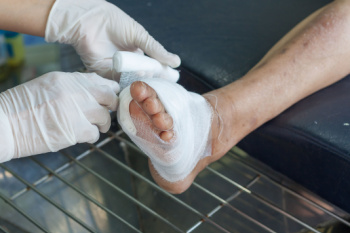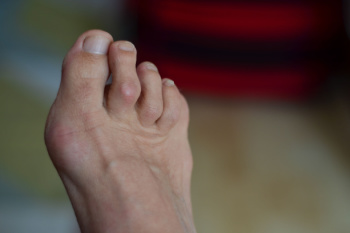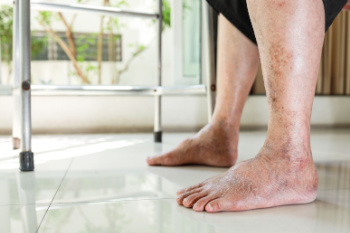
Diabetic feet represent a significant concern for individuals living with diabetes, as the condition can lead to various complications affecting foot health. One critical fact about diabetic feet is the increased risk of nerve damage, known as peripheral neuropathy, which can result in reduced sensation and difficulty detecting injuries or ulcers. Additionally, diabetes can impair blood circulation, leading to poor wound healing and an increased susceptibility to infections. Individuals with diabetes are also prone to developing foot ulcers, which, if left untreated, can escalate into serious complications such as gangrene and amputation. Proper foot care and regular inspections are essential for individuals with diabetes to prevent complications. This includes keeping the feet clean and moisturized, wearing comfortable and well-fitting shoes, inspecting the feet daily for cuts or sores, and seeking prompt medical attention for any signs of infection or injury. If you have diabetes, it is strongly suggested that you are under the care of a podiatrist who can help you manage this serious condition.
Diabetic foot care is important in preventing foot ailments such as ulcers. If you are suffering from diabetes or have any other concerns about your feet, contact our podiatrists from CNY Foot Surgery & Podiatry Care. Our doctors can provide the care you need to keep you pain-free and on your feet.
Diabetic Foot Care
Diabetes affects millions of people every year. The condition can damage blood vessels in many parts of the body, especially the feet. Because of this, taking care of your feet is essential if you have diabetes, and having a podiatrist help monitor your foot health is highly recommended.
The Importance of Caring for Your Feet
- Routinely inspect your feet for bruises or sores.
- Wear socks that fit your feet comfortably.
- Wear comfortable shoes that provide adequate support.
Patients with diabetes should have their doctor monitor their blood levels, as blood sugar levels play such a huge role in diabetic care. Monitoring these levels on a regular basis is highly advised.
It is always best to inform your healthcare professional of any concerns you may have regarding your feet, especially for diabetic patients. Early treatment and routine foot examinations are keys to maintaining proper health, especially because severe complications can arise if proper treatment is not applied.
If you have any questions please feel free to contact our office located in East Syracuse, NY . We offer the newest diagnostic and treatment technologies for all your foot and ankle needs.

Hammertoe, a common foot deformity, can be attributed to various underlying factors, including rheumatoid arthritis, bunions, and corns. Rheumatoid arthritis, an autoimmune condition characterized by inflammation in the joints, can lead to the weakening of the muscles and ligaments in the toes, causing them to contract and deform over time. Similarly, bunions, bony protrusions that form at the base of the big toe, can exert pressure on adjacent toes, causing them to bend abnormally. Additionally, corns, thickened areas of skin caused by friction or pressure, can also contribute to hammertoe by forcing the toes into a bent position. Over time, these factors can result in the development of hammertoe, characterized by a permanent bend in one or more toes. Understanding the relationship between rheumatoid arthritis, bunions, corns, and hammertoe is important for implementing preventive measures and seeking appropriate treatment to alleviate symptoms and prevent further deformity. If you have developed this foot condition, it is suggested that you consult a podiatrist who can treat hammertoe.
Hammertoes can be a painful condition to live with. For more information, contact our podiatrists of CNY Foot Surgery & Podiatry Care. Our doctors will answer any of your foot- and ankle-related questions.
Hammertoe
Hammertoe is a foot deformity that occurs due to an imbalance in the muscles, tendons, or ligaments that normally hold the toe straight. It can be caused by the type of shoes you wear, your foot structure, trauma, and certain disease processes.
Symptoms
- Painful and/or difficult toe movement
- Swelling
- Joint stiffness
- Calluses/Corns
- Physical deformity
Risk Factors
- Age – The risk of hammertoe increases with age
- Sex – Women are more likely to have hammertoe compared to men
- Toe Length – You are more likely to develop hammertoe if your second toe is longer than your big toe
- Certain Diseases – Arthritis and diabetes may make you more likely to develop hammertoe
Treatment
If you have hammertoe, you should change into a more comfortable shoe that provides enough room for your toes. Exercises such as picking up marbles may strengthen and stretch your toe muscles. Nevertheless, it is important to seek assistance from a podiatrist in order to determine the severity of your hammertoe and see which treatment option will work best for you.
If you have any questions, please feel free to contact our office located in East Syracuse, NY . We offer the newest diagnostic and treatment technologies for all your foot care needs.

Your feet, often overlooked, hold valuable clues about your overall health. They serve as a mirror reflecting various underlying conditions that might otherwise go unnoticed. Paying attention to subtle signs can provide insight into your well-being. For instance, cold feet could indicate poor circulation, while dry, cracked skin might suggest dehydration or a nutrient deficiency. Swelling may signal issues with your heart, kidneys, or lymphatic system. Additionally, changes in toenails, such as discoloration or thickening, may hint at fungal infections or more serious ailments like diabetes or psoriasis. Moreover, persistent foot pain might not just be due to overuse but could signify conditions like plantar fasciitis or arthritis. Therefore, by observing and heeding the messages your feet convey, you can take proactive steps toward maintaining optimal health and addressing potential concerns before they escalate. After all, your feet are more than just the foundation of your body, they are valuable indicators of your overall well-being. If you have foot pain, it is suggested that you visit a podiatrist who may find underlying health issues and offer you specific treatment plans.
When dealing with systemic disease of the feet, it is extremely important to check the affected areas routinely so that any additional problems are caught quickly. If you have any concerns about your feet and ankles contact our podiatrists from CNY Foot Surgery & Podiatry Care. Our doctors will assist you with all of your podiatric needs.
Systemic Diseases of the Feet
Systemic diseases affect the whole body, and symptoms usually are displayed in the feet. This condition can make a patient’s ability to walk unbearable. Systemic diseases include gout, diabetes mellitus, neurological disorders, and arthritis.
Gout – is caused by an excess of uric acid in the body. Common symptoms include pain, inflammation, and redness at the metatarsal/phalangeal joint of the base big toe. Gout can be treated by NSAIDs to relieve pain and inflammation, and other drugs that lower the acid levels in the body.
Diabetes mellitus – is an increase in the level of blood sugar that the body cannot counteract with its own insulin. Failure to produce enough insulin is a factor in Diabetes.
Diabetes of the Feet
Diabetic Neuropathy – may lead to damaged nerves and affect the feet through numbness and loss of sensation.
Peripheral Vascular Disease – can restrict the blood flow to the feet, and often times lead to amputation of the feet.
If you have any questions please feel free to contact our office located in East Syracuse, NY . We offer the newest diagnostic and treatment technologies for all your foot and ankle needs.




